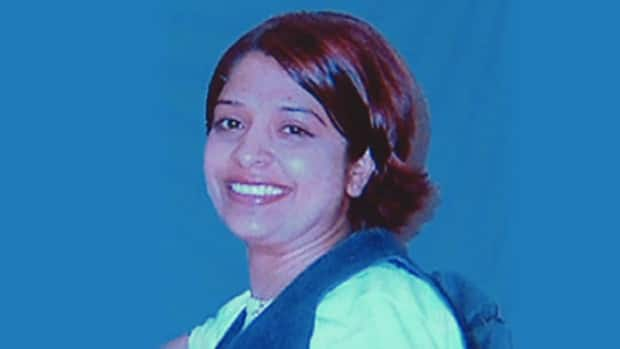Man who beat wife to death in Fredericton appeals denial of early parole

A New Brunswick man serving a life sentence for first-degree murder in the 2003 beating death of his estranged wife was back in court this week.
Abdul Bari, 54, is appealing a judge's decision to dismiss his so-called faint-hope application for early parole.
A jury found Bari guilty in 2004 of killing Shaila Akther Bari, 26, in Fredericton. She had been bludgeoned and suffocated in her Regent Street apartment.
Bari was sentenced to life in prison with no chance of parole for at least 25 years.
In 2019, Bari applied to reduce his parole ineligibility to 15 years under the so-called faint hope clause of the Criminal Code.
The case could be precedent-setting for the province.
At the time Bari was sentenced, the Criminal Code only allowed a faint hope application to go before a jury if a judge first screened the application and concluded there was a "reasonable prospect" of success.
In 2011, that section was amended and now requires an applicant to establish he or she has a "substantial likelihood" of success if the application were allowed to go before a jury.
Bari argued the retrospective application of the new screening threshold infringed his right to benefit from the lesser punishment in situations where the punishment for the offence has changed between the time of the crime and the time of sentencing.
But on June 22, 2020, New Brunswick Court of Queen's Bench Chief Justice Tracey DeWare dismissed his Charter of Rights application and ruled he would be subject to the higher threshold of review.
On Dec. 18, 2020, DeWare ruled Bari had failed to establish he had a "substantial likelihood" of success should a jury be empanelled, and she dismissed his faint hope application.
Bari appealed, challenging both decisions.

On Thursday, his lawyer Ben Reentovich argued before three justices of the New Brunswick Court of Appeal in Fredericton that DeWare erred in both law and fact.
Bari, who is being held in minimum security at Dorchester Penitentiary, was in court for the proceedings.
Reentovich said DeWare held Bari to a higher standard than required by law, and this was a violation of his rights under a section of the charter.
It's possible Bari's application might have proceeded to the next stage if judged on the lower standard of a reasonable prospect of success, he said. But Bari lost the opportunity to make his case to a jury.
Reentovich said DeWare seemed to reason that the change is minimal, since it's still a screening process, but he argued it constitutes punishment and is therefore a violation.
Even if the court finds there was no violation of Bari's charter right or that it was justified, Renntovich argued, DeWare erred in how she applied the standard of review to the facts.
Bari's prison record 'stellar'
In her written decision, DeWare found, "It is difficult, in this matter, to point to factors in Mr. Bari's case that would justify a departure from the normal legislated sentence other than his stellar record while in prison."
She seemed to rely primarily upon two factors, Reentovich said: Bari's late acceptance of responsibility for his actions, and his views as to how his crime impacted his life.
Not taking immediate responsibility for his actions is a factor to be considered but should not be a determining one, Renntovich said.
And while DeWare concluded that Bari continues to believe he is a victim and is focused on his losses, Renntovich pointed out that English is not Bari's first language.
He's accepted responsibility for his actions [and] is remorseful. - Ben Reentovich, defence lawyer
"She took the words of a non-English speaker and parsed them … and she found them wanting."
Reentovich wants the Court of Appeal to overturn her decision and order that Bari be allowed to bring his application directly to a jury, or that it be sent back to a Court of Queen's Bench judge to be determined based on a lower standard of "reasonable prospect" of success.
He argued Bari meets the lower threshold, based on his prison record, the support of his parole officer, his family, community members and former co-workers.
"He's accepted responsibility for his actions [and] is remorseful."
Crown prosecutor Patrick McGuinty countered that DeWare did not err in law when she concluded that the Criminal Code change did not violate Bari's charter rights.
The provision does not constitute "punishment," he said, so it doesn't trigger the protection under the charter section — Section 11(i) — that the defence believes was violated.
It allows an applicant to try to decrease their punishment, McGuinty said. It's compassionate, an "an escape route from your original punishment."
McGuinty said Bari was always subject to a judicial screening standard and would have tried to present a case with the highest probability of success, regardless of the screening standard that applied.
Section 11(i) is concerned with two points in time: the time of the commission of the offence and the time of sentencing, said McGuinty.
Late acceptance of responsibility cited
In 2003, when the offence was committed and 2004 when Bari was sentenced, Bari was subject to the "reasonable prospect" of success threshold. Because of the 2011 amendments and their retrospective nature, he is now subject to the "substantial likelihood" threshold, he said.
DeWare did not err in law and fact when she dismissed Bari's application either, argued McGuinty. She conducted a thorough analysis and carefully weighed the evidence, he said.
McGuinty also took "strong issue" with the defence's position that Bari has taken responsibility for his actions and shown remorse.
Bari made a "feeble admission" in 2014, a decade after he was convicted of first-degree murder. He said he couldn't remember much and didn't mean to kill his estranged wife, so he denied he intended to kill her and that it was planned, McGuinty said.
Also in 2014, Bari denied he had harassed Akther Bari, even though he pleaded guilty to criminally harassing her a month before he killed her, he said.
In 2016, there was what McGuinty described as a "persistent deep-seated theme" that Bari was the victim.
"He's lost his wife, his child, and 'I'm the biggest loser,' not the one who had her life taken away from her."
Crow rejects suggestion Bari's a victim
In 2017, Bari felt his anger toward her was justified, said McGuinty, quoting from DeWare's decision.
In 2020, Bari said he only struck her four or five times and claims he did not suffocate her, despite clear evidence to the contrary. He wasn't even sure he did strike her, he claimed. Someone was lying in the bed, but he wasn't sure if it was her.
So he "never truly admitted to this crime at all," argued McGuinty.
He and fellow prosecutor Rachel Anstey asked the court to dismiss the appeal. If the court allows the appeal, they asked that a new screening hearing be ordered in the Court of Queen's Bench.
The panel, led by Chief Justice Marc Richard, has reserved decision. No date was indicated. The other panel members are justices Barbara Baird and Raymond French.
Attorney General of Canada opted not to participate in the proceedings.
If Bari's appeal is successful, the next stage of the application process would require a jury reviewing his case to unanimously decide to reduce his period of parole ineligibility.
Bari would then be allowed to apply to the parole board for early parole.
He is currently eligible for parole on Feb. 8, 2029. His appeal is unsuccessful, he will be eligible to apply for early parole again in 2025.
Pry bar possible murder weapon
Police found the body of Akther Bari in her single-room apartment on July 22, 2003, after her friends reported her missing. She was on a bed with pillows over her face.
Her jaw was broken in at least two places, at least four ribs were fractured, the back of her head was cut and blood was coming from her nose and mouth.
She died from a combination of a sharp- and blunt-force trauma to the head and chest followed by suffocation, the trial heard.
Forensic evidence revealed a pry bar could have been used to inflict some of her injuries.
Bari's bank card was used to purchase a pry bar from a local Canadian Tire the same day the victim was last seen alive.

